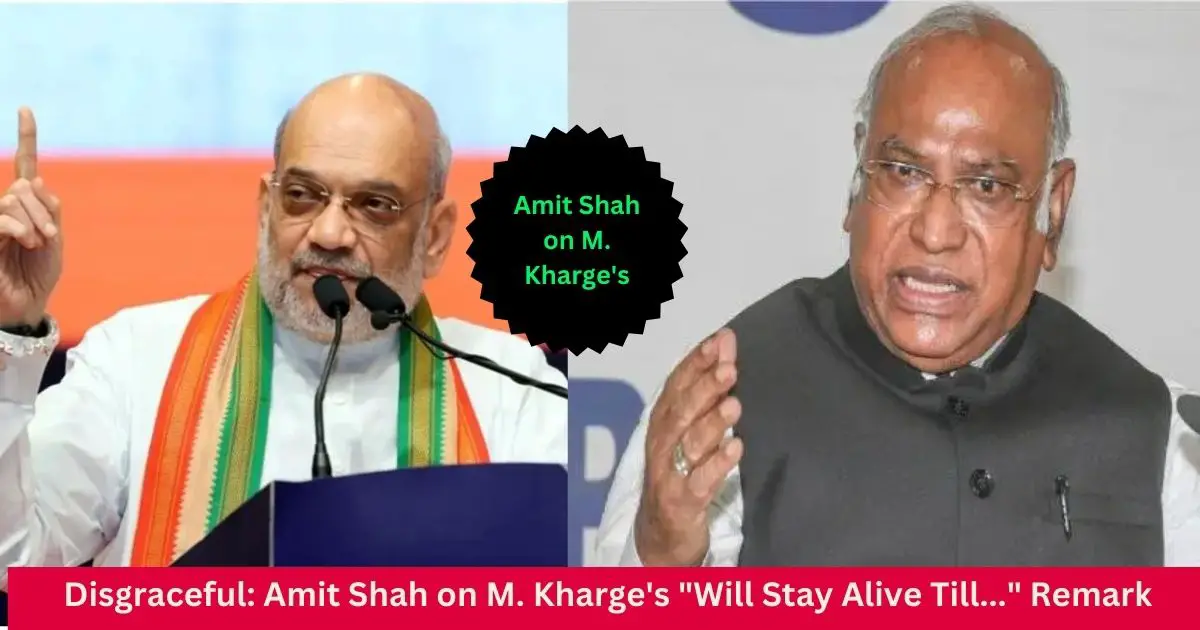His statement, “I will stay alive till I see Narendra Modi removed from power,” drew sharp criticism from Home Minister Amit Shah, who described the remark as “disgraceful.” This incident not only highlights the intense political rivalry between the BJP and Congress but also raises questions about the nature of political discourse in India.
The Context of Kharge’s Statement
Mallikarjun Kharge made his remarks during a rally, expressing his determination to see a change in leadership at the national level. This statement came amid heightened political tensions as India gears up for the 2024 general elections. Kharge’s comments can be seen as a reflection of the deep-seated animosity that exists between the two major political parties in the country.
For many, Kharge’s statement is emblematic of the desperate times faced by the opposition, struggling to consolidate their strength against the BJP, which has maintained a dominant position in Indian politics for nearly a decade. Kharge’s passionate assertion resonated with many supporters who share his sentiments of dissatisfaction with the current government.
Amit Shah’s Response
Amit Shah’s reaction to Kharge’s comments was swift and pointed. Describing the remark as “disgraceful,” Shah condemned the Congress leader for what he perceived as a lack of respect for democratic values. Shah argued that wishing to outlive a political opponent undermines the spirit of democracy and can lead to a toxic political atmosphere.
Shah’s response underscores a broader issue within Indian politics—where personal attacks and inflammatory remarks can overshadow meaningful dialogue and policy discussions. The Home Minister emphasized that political leaders should focus on constructive criticism and work toward the nation’s betterment rather than indulging in personal vendettas.
The Political Landscape
Kharge’s statement and Shah’s subsequent condemnation are indicative of the polarized political landscape in India. The ruling Bharatiya Janata Party (BJP) has consistently portrayed the Congress party as outdated and ineffective, while the opposition has sought to highlight issues such as unemployment, inflation, and alleged authoritarianism under the Modi administration.
The backdrop of this political rivalry is essential to understanding the emotional intensity behind Kharge’s words. For many in the Congress party, the upcoming elections represent a last chance to reclaim power after a series of electoral defeats. The pressure to galvanize support and energize the party base is immense, leading to emotionally charged statements.
The Role of Rhetoric in Politics
The rhetoric employed by politicians often reflects their strategy for garnering support. Kharge’s statement could be interpreted as an attempt to mobilize the party’s base by articulating a strong desire for change. Such remarks resonate with constituents who are frustrated with the status quo, providing a rallying cry for those who feel marginalized by the current government.
However, the danger of this approach lies in the potential to escalate tensions. When political leaders make incendiary comments, it can contribute to an environment where dialogue is replaced by hostility. Shah’s condemnation of Kharge’s remarks serves as a reminder that responsible leadership should prioritize civility and constructive engagement, even amidst fierce competition.
Public Reactions and Media Coverage
The public reaction to Kharge’s statement has been mixed. Supporters of the Congress party viewed it as a bold declaration of their commitment to ousting the BJP from power. Conversely, BJP supporters and many commentators in the media echoed Shah’s sentiments, criticizing Kharge for what they perceive as a reckless comment that undermines democratic values.
Media coverage of the incident has varied, with some outlets focusing on the escalating tensions between the two parties, while others have highlighted the implications of such rhetoric on the electoral landscape. The incident serves as a case study in how political discourse can shape public perception and influence voter sentiment leading up to elections.
The Importance of Constructive Discourse
As India approaches a crucial electoral period, the need for constructive political discourse becomes increasingly vital. Leaders from all parties must strive to engage in dialogue that elevates the conversation beyond personal attacks and inflammatory remarks. Fostering an environment where differing opinions can be expressed respectfully is essential for the health of a democratic society.
Constructive criticism and policy discussions should take precedence over personal animosities. Political leaders have a responsibility to present their visions for the future and engage with citizens on the issues that matter most, rather than getting caught up in a cycle of retaliation and negativity.
Conclusion
The exchange between Mallikarjun Kharge and Amit Shah serves as a poignant reminder of the current state of political discourse in India. While Kharge’s passionate remarks reflect the frustrations of many citizens, Shah’s condemnation highlights the importance of maintaining respect for democratic principles. As the nation gears up for the 2024 elections, it is crucial for political leaders to prioritize constructive dialogue and work towards a vision that unites rather than divides.
In a democracy as vibrant and diverse as India, the power of words can shape the future. Leaders must wield that power wisely, fostering an environment where healthy debate and mutual respect prevail over disdain and animosity. Only then can the democratic spirit truly thrive, ensuring that all voices are heard and valued in the national conversation.

